Companies ranging from Gucci to Fiat Chrysler are doing their bit in the fight against coronavirus by manufacturing face masks
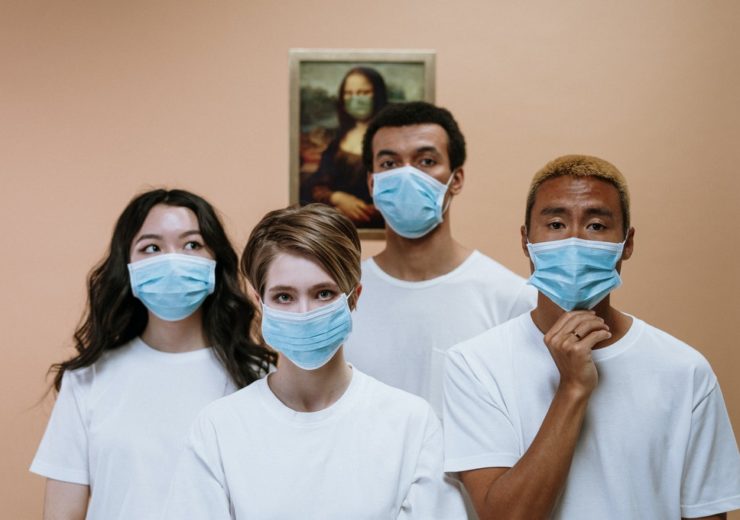
Many countries have faced critical shortages of face masks and other PPE during the Covid-19 crisis (Credit: Pexels/cottonbro)
Whether it’s the breakdown of global supply chains or a lack of manufacturing capacity, supplies of medical face masks are under threat globally. Thomas Parker finds out how companies and individuals from inside and outside the medical industry are helping to plug the gap caused by the coronavirus pandemic.
It was during the First World War that the forerunner of Medline Industries, then a small company set up in 1910 to make butchers’ aprons, began supplying US medics on the frontline with surgical gowns.
Fast-forward a century, and the firm — owned by the same family but now a global player in personal protective equipment (PPE) with a turnover of $13.9bn — is once again at the forefront of a global battle to scale-up production of these vital medical supplies.
Medline’s workforce of more than 22,000 people across the world has ramped up production of face masks, gowns and gloves to help tackle shortages faced by healthcare providers in the fight against Covid-19.
“We are trying to do as much as we can,” says Matthieu Menut, the company’s Proxima preventative care division director in Europe.
“In a matter of weeks, we went from zero to making about 40 million face masks. This might go up to 60 or 80 million, but we’re acting pretty much on a day-by-day basis.
“We’re still monitoring demand, looking at how many of those masks are needed on the market.
“Right now the demand is still pretty high, so there’s no real question behind that, but this can change from one day to another.”
Making surgical masks, Medline’s most popular variety, is relatively straightforward — it’s effectively a case of attaching a piece of string to some cloth — so there’s no question about the ability to upscale production.
Instead, the biggest area of concern for the company is the constant price fluctuations.
Menut adds: “We’re talking about 10-times more for a surgical face mask than usual, so we also have to be very careful with the volumes we are trying to bring in.
“You can’t be overstocked for three or four months with masks that are worth up to 10-times more than the normal cost of a mask — the risk is having all that stock at a very high cost staying in the warehouse.
“So we are pretty much revising our plan on a daily basis.”
Governments make call for more manufacturing of face masks in coronavirus battle
Face masks and PPE have become central to the Covid-19 conversation as the disease tightens its grip on the world.
They are regarded as essential items in hospitals, where the equipment could prove the difference between life and death for doctors, nurses and patients.
In early March, the World Health Organisation’s (WHO) director-general Dr Tedros Adhanom Ghebreyesus called on industry and governments to increase manufacturing by 40%.
“Without secure supply chains, the risk to healthcare workers around the world is real,” he said.
“Industry and governments must act quickly to boost supply, ease export restrictions and put measures in place to stop speculation and hoarding. We can’t stop Covid-19 without protecting health workers first.”
The WHO estimated 89 million medical masks would be required for the Covid-19 response each month, along with 76 million examination gloves and 1.6 million goggles.
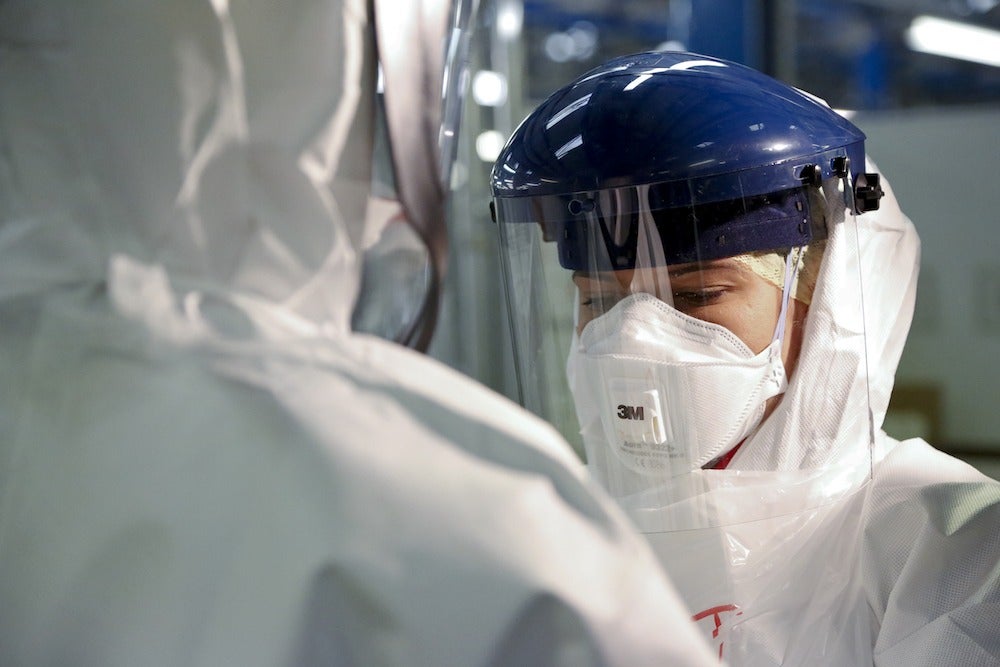
And it’s not just in healthcare where PPE is gaining traction. While many countries have closed schools, shut businesses and banned public meetings to reduce the spread of the virus, large sections of the general public must still venture outside their homes for groceries and essential work.
An increasing number of these citizens are attempting to mitigate the risk by wearing surgical face masks — with their use mandatory in the likes of Singapore and parts of China, Italy and Germany.
Qing Wang, a professor at Warwick Business School, part of the University of Warwick, says: “Requiring everyone to wear face masks in public places, such as supermarkets, appears to have been critical in helping China to suppress its Covid-19 outbreak.
“This is particularly important for key workers who rely on public transport or operate in an environment where it’s hard to maintain adequate social distancing.”
China’s policy has seen it manufacture 200 million face masks a day — more than 20-times the amount it made at the start of February.
There is some concern, however, about how effective certain face masks could be at protecting individuals.
The US Centers for Disease Control recommends people should wear cloth face coverings, however, this should be done to protect other members of the public and limit the spread of the disease.
However, there are doubts that this will be enough to prevent people from catching Covid-19.
Menut adds: Even if someone wears a mask, and then touches their face without the mask when they’re back home, they could still get the virus in the same way.”
What are the different types of medical face masks?
There are two main types of medical face masks involved in the coronavirus-related manufacturing ramp-up: Surgical and respirator.
Surgical face masks are typically worn by health professionals during surgery and nurses to catch bacteria in liquid droplets and aerosols from the user’s mouth and nose.
They not designed to protect the wearer from inhaling airborne bacteria and virus particles — a job more effectively carried out by respirator masks, which provide better protection due to their material, shape and tight seal.
It’s expected that surgical masks will see the highest demand from the general public.
Menut explains: “These provide sufficient protection for direct contact with people — for example, if you are face-to-face with someone, a surgical face mask would do a good job.
“If, however, someone is in contact all day with people who have definitely got coronavirus — such as healthcare professionals — then respirator masks make more sense.”
Surgical masks are easier to mass-produce than respirator masks, because they don’t require such a tight seal around the face — and make up much of the current market.
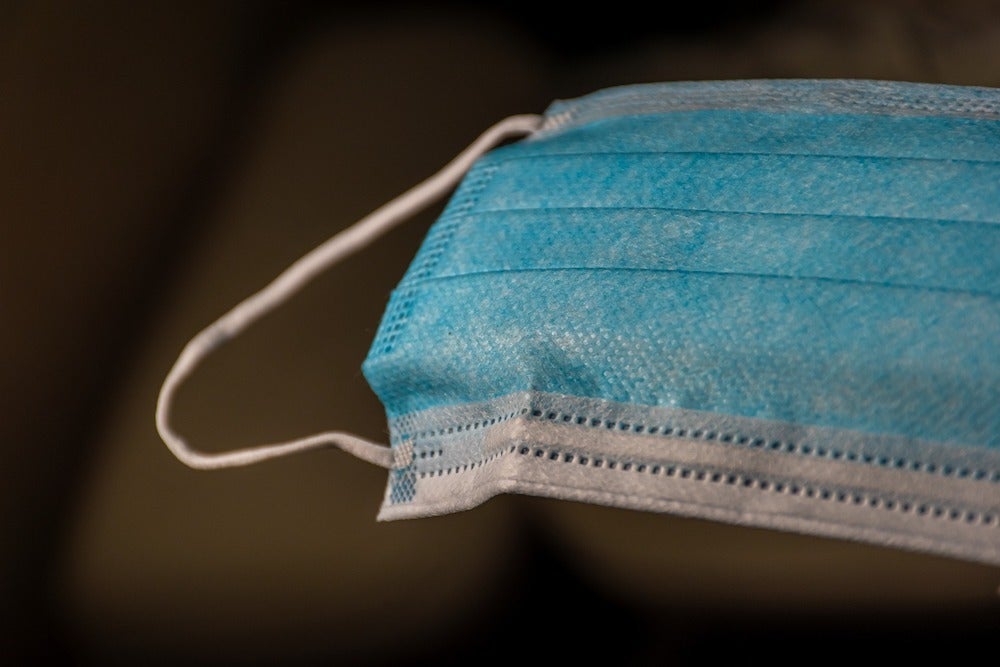
Menut explains: “This is because the normal demand for surgical face masks before the Covid-19 crisis is much higher than for a respirator.
“It’s also because the machines making surgical masks are probably running two or three times faster than a respirator mask machine.
“The respirator mask is, first of all, thicker and the shape is more complex, meaning the machine can’t run as fast — whereas a surgical mask is just a rectangular piece of fabric with some elastic bands tied to it.”
Surgical masks sold in the EU require a CE mark as they are a class-one medical device and must prove features such as breathability, splash resistance and efficiency in filtering bacteria. A similar test is performed in the US by the Food and Drug Administration (FDA).
More stringent rules govern respirator masks, which are regulated as PPE and must prove they are fully sealed before going to market.
Beyond masks, the next most in-demand item of PPE is protective gowns, which cover almost the full body.
The problem, says Menut, is that the focus on masks is so intense right now that there’s not enough companies making gowns, which have a more complex design.
“There are different sizes of gowns and different materials used,” he adds.
“They have to be manually assembled because the shape is so complex that you can’t find any good machines to produce it.”
How large medical companies are ramping up production of face masks and PPE
It’s not just Medline ramping up production of face masks, with medical device industry giants from across the globe looking to develop more products.
In the US, market leader 3M has announced it will supply more than 200 million respirator masks to countries in North America over the next three months — but it hasn’t been without problems.
US officials had stopped a shipment of about three million respirator masks from being exported to Ontario after President Donald Trump invoked the Defense Production Act to halt exports to Canada and Latin America.
But after managing to source 166 million masks from China, 3M struck a deal with the White House that enabled it to continue exporting — with 500,000 products immediately cleared for release to the Canadian province.
Speaking at the time, 3M CEO Mike Roman said: “Given the reality that demand for respirators outpaces supply, we are working around the clock to further expand capacity, while prioritising and redirecting our supplies to serve the most critical areas.”
Currently, 3M manufactures about 35 million face masks a month in the US, which, according to medical devices analyst at market research company GlobalData Alison Casey, is the peak of its capacity.
She adds: “In January and February, the stocks probably weren’t running out — but once they do run out, businesses are limited in what they can do, because they can only supply what they’re making.”
Like most, 3M’s respirator face mask design of choice is the N95 — named as such because it blocks at least 95% of small micron test particles.
Alongside healthcare, these masks are used in the construction, painting and mining sectors.
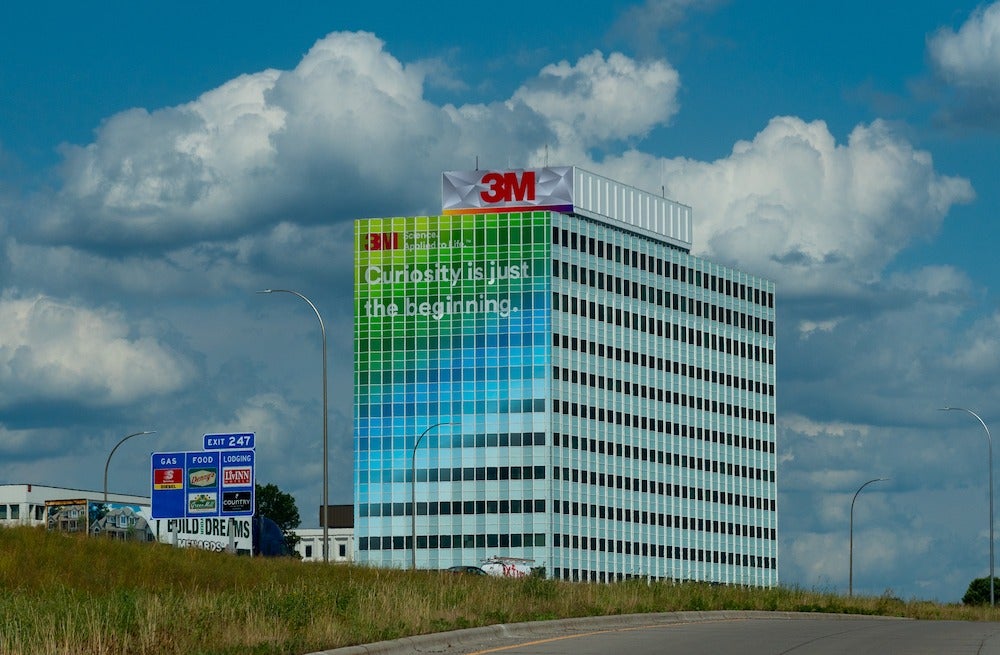
In the US, all these masks must be approved by the National Institute for Occupational Safety and Health.
Casey adds: “A subset of N95 masks are also approved by the FDA.
“This second approval process has got less to do with the resource because all of them have a certain grade of filtration — it looks more at how tightly it fits to someone’s face.”
Most N95 respirator masks in Europe are rated as either an FFP2 or an FFP3 product — which stands for “filtering face piece” and ranks the protection that masks provide the wearer from outside substances, with FFP3 the higher standard.
For the UK’s NHS, these PPE devices are in short supply — with a growing number of hospitals running so short of FFP3 face masks, they have no longer insisted staff have a “fit-test” for checking a mask they wear is fully sealed before treating infected patients.
Frontline health workers in the country have also warned they are running out of basic PPE equipment, such as gowns and visors, with some doctors and nurses reportedly asked to work without full-length coverings as supply struggles to meet demand.
Warwick Business School’s Prof Wang says there is a “serious shortage of UK suppliers” and has petitioned the government to collate a cross-industry effort similar to the one that has already helped to deliver more ventilators to intensive care units.
Even in the US, there have been signs of this happening, with car manufacturer Fiat Chrysler pledging to donate more than a million face masks every month to hospital and emergency services workers, and sports brand New Balance pivoting its workforce towards making 100,000 masks per week.
But in the UK, there hasn’t been as much attention, according to Prof Wang.
“The government has acted promptly to encourage national industry to produce ventilators, but the need for the UK to produce more face masks has been largely overlooked,” she adds.
“If we are to meet demand and successfully suppress the virus, we urgently need to develop our national capacity to produce different grades of face mask for NHS staff and the general public.”
Role of fashion industry in manufacturing face masks
Usually at this time of year, fashion designer Christian Siriano would be preparing his 2021 collections.
Instead, as clothing sales in the US fell by more than half between February and March, according to the US Census Bureau, he has repurposed his manufacturing hub to make face masks.
Speaking to Good Morning America in late March, the New York-based designer said: “It was really a simple thing and I just felt like it was a really important time because I felt like it was so needed — not just in New York, but everywhere.”
Siriano added his masks have been worn by healthcare staff at New York-Presbyterian Hospital.
He said: “I think the masks that we are making are actually an upgrade from what they even have.
“It’s washable, bleachable — that was really important that they could re-wear it.”
He admitted there were a lot of regulations to navigate for his fashion house, which had suspended production for clothes, to make masks suitable for medical professionals.
“Even if we help 100 people, that’s more people than nothing,” he added.
Siriano is just one of a growing ecosystem of large and small fashion brands helping develop more face masks.
Towards the end of March, fashion industry giant Prada announced it had begun making 110,000 masks to be allocated to healthcare professionals — alongside 80,000 medical overalls.
These products — completed at the start of April — were produced following a request from the Italian region of Tuscany.
French luxury fashion firm Kering said in March it would provide three million surgical face masks to the French health service, which it would buy and import from China.
Alongside this, the company said its Balenciaga and Yves Saint Laurent brands would begin manufacturing masks.
In the same month, Italian fashion house Gucci — which is also owned by Kering — said it would be donating more than a million surgical masks to the Italian region of Toscana.
Todd Lynn, professor of design at Kingston School Art, says this scale-up in face mask manufacturing would be slightly easier for the bigger companies because “they do have an infrastructure in place”.
He adds: “They can do it at a much higher industrial level, because they have access to materials that are in stock or available.
“They’re also not so reliant on outside sources.”
Alongside the big-name brands, some smaller fashion labels are joining forces to make face masks.
In March, London-based designers Holly Fulton, Bethany Williams and Phoebe English formed the Emergency Designer Network (EDN) to support hospital stocks of key protective garments — using Instagram to announce they had the necessary machinery for manufacturing.
The group enlisted the help of “connector” Cozette McCreery, who set up a GoFundMe page to raise money for raw materials.
The team — which is now made up of 10 small-scale UK manufacturers and designers — is currently focused solely on making scrubs, with English saying this was because “they are the best match for the skills and equipment that we have access to”.
The EDN robes and scrubs being made are hospital-approved, but not government-approved — meaning they adhere to many, but not all, manufacturing guidelines.
The organisation says these products should not be used in place of government-issued PPE equipment, but can instead offer a lower-level protection to staff and carers, or can be worn as an undergarment layer.
UK hatmakers have also put their heads together to contribute to the national PPE effort, with both milliners and individuals joining the so-called Visor Army to sew garments at home.
Among these businesses is royal milliner Philip Tracy, which will supply protective visors to NHS staff across London, where more coronavirus cases have been confirmed than any other UK region.
Writing on his Instagram account, the company’s owner Philip Tracy said: “The current scenario meant an extraordinary shift in the way we live our lives and re-evaluation of what is important.
“No-one is unaffected and all support, little or big, is a step closer to better days.”
The Visor Army’s face shield effort is coordinated by a Facebook group. One of its members is London-based Noel Stewart, the owner of hatmaker Noel Stewart Millinery, who became involved when he saw Tracy’s work in the project.
He has set up a manufacturing hub in East London made up of milliners and skilled craftspeople.
“This ranges from make-up artists to set designers to architects — people who are used to handling these kinds of materials,” he says.
“We’ve done one lot, and now we’re just waiting for the next batch of materials to arrive so we can make more.”
Other industries manufacturing face masks for coronavirus effort
If hatmakers and fashion designers are the traditional face of manufacturing that is being retooled for face masks, 3D Folkes offers up the modern image.
The 3D printing company is best known for using advanced manufacturing techniques to create a lightweight prosthetic arm for a six-year-old girl but, after production ceased at its Sheffield base, it has allocated resources to printing parts for medical visors.
It’s one of the bigger businesses involved in 3DCrowd UK, a coalition of more than 7,000 volunteers — both hobbyists and professional 3D printers — manufacturing visors set up by palliative medicine doctor James Coxon.
3D Folkes managing director Ben Folkes says the reason 3DCrowd UK is focusing on medical visors, rather than other PPE products, is because they are “really quick to print”.
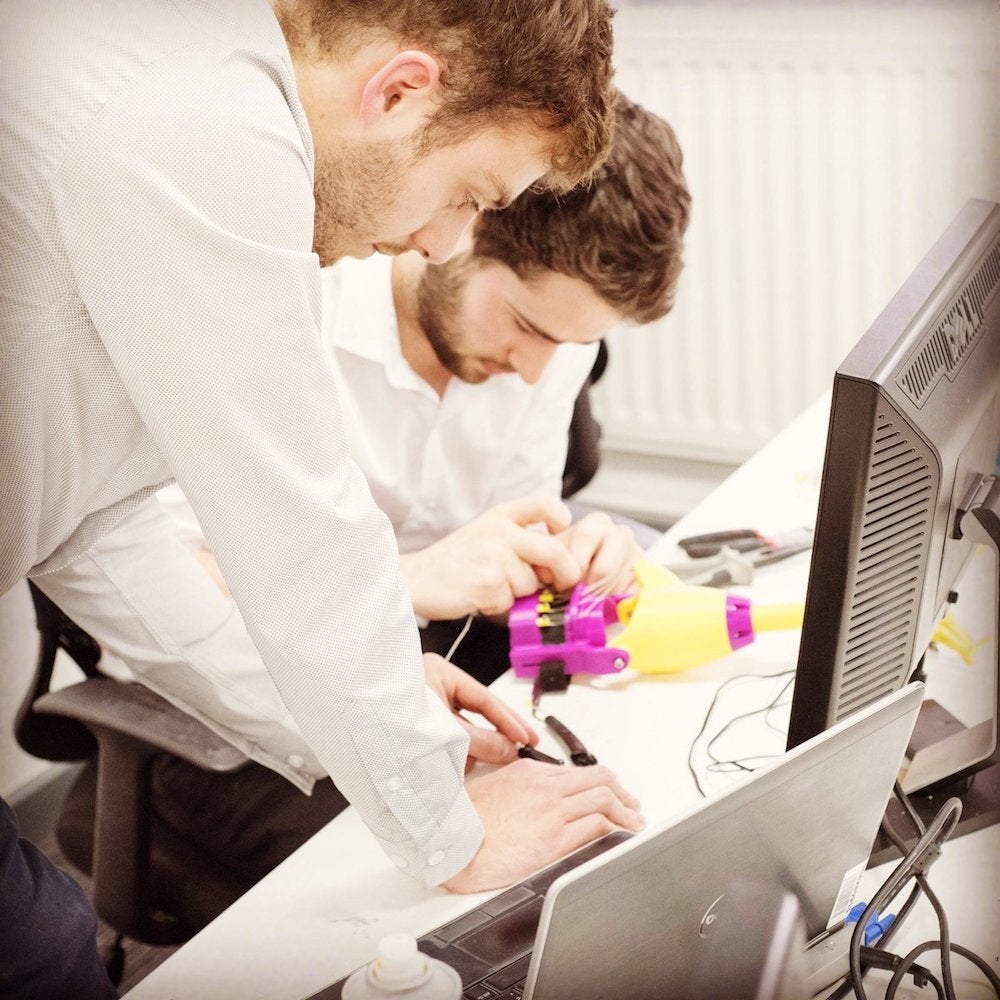
He adds: “You can print one headband for a visor every hour or so.
“Alongside this, doctors have been saying that, although these visors are not the perfect PPE product, they offer an extra level of security.”
Blockchain is another new technology that could help to secure medical supply chains in the future by adding a level of transparency, but in the meantime, it’s provided Dexter Blackstock with a wide contact base that’s enabled him to source “millions” of face masks, gowns and gloves from suppliers in China and Europe — which have been sold to several NHS trusts, council-run care homes and police forces.
The ex-footballer is CEO of healthtech start-up MediConnect, which is building a platform that will use the decentralised distributed ledger technology to track pharmaceuticals throughout their journey from the factory to a patient.
“We’ve had to be in communication with every step of the supply chain to put our blockchain technology together so we’ve made lots of contacts with pharmacies, manufacturers, distributors and logistics companies, says the 33-year-old former Nottingham Forest and QPR striker, who has also set up the donatetoNHS.com fundraising website that will use donations to buy more PPE.
“When the coronavirus outbreak happened and there was a shortage of PPE, we were able to source these products due to our relationships with all these different parties.
“The government has its sources and connections, which have been adequate previously, but as demand has jumped up, the NHS suppliers haven’t been able to get enough as it doesn’t have access to every warehouse and factory in China.
“I’ve seen some people sending money to factories that don’t even exist.
“There’s a lot of opportunists out there coming out of the woodwork who don’t have the know-how to get these products into the market but we could call upon four or five trusted manufacturers.”
Whether it is being sourced from tech start-ups and small fashion houses, or traditional manufacturers from both medical and non-medical industries, PPE appears to be the words on everyone’s lips right now — a situation that doesn’t look like it will change anytime soon.
“Face masks and gowns are the two products that have been highly required,” adds Menut.
“The demand will probably keep being quite high because more governments across the globe are potentially thinking of having people wearing a mask when they reopen the door for people to go out.”


